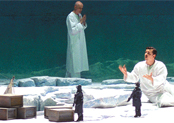OPERA SEARCH

UNSICHTBAR LAND
(Invisible Land) (2004/05)Helmut Oehring, Torsten Ottersberg and historical sources (G-E)
3 deaf sign language artists; S,M,CT,T,BBar; speaker; chorus(12S.8A.10T.10B); solo elec.git; solo trp; solo bcl; 2(I,II=picc).0.1.bcl.tsax.0.dbn-3.3.3.1-perc(3)-tuned pft(=cel)-strings(4.2.0.6.6); baroque ensemble:2ob.1bn-theorbe-vla da gamba-cem(=org)-strings(2.2.1.1.1)-live electronics-2video beamer,3slide projector,sliding overtitle projection
Abbreviations (PDF)
Bote & Bock
Theater, Basel
Claus Guth, director
Conductor: Jürg Henneberger
Company: Ensemble, Chor und Orchester des Theaters Basel
In UNSICHTBAR LAND (Invisible Land), two stories are interwoven: Shakespeare’s ‘The Tempest’ and a failed expedition into an icy landscape. Foreign worlds meet and merge into each other.
In Shakespeare’s ‘The Tempest’, Prospero lives with his daughter Miranda on a lonely island after having been expelled from his court. He has made the two inhabitants of the island, the spirit Ariel and the ‘savage’ Caliban, into his subjects. Using magical powers and Ariel’s assistance, Prospero raises a storm in order to shipwreck his court opponents on the island. While the courtiers are wandering about the island, Prospero arranges a meeting between Miranda and young Ferdinand – the two fall in love. Eventually Prospero discloses his real identity to his enemies and forgives them. Renouncing magic, he releases Ariel.
On 15 December 1914, the polar explorer Sir Ernest Shackleton sets sail with his expedition vessel ‘Endurance.’ On the vessel there are 27 official expedition members and one stowaway. The aim of the journey is to be the first to cross the antarctic continent from coast to coast via the pole. Shackleton and his team do not reach their destination. The ‘Endurance’ is locked in drifting pack-ice, and, a few months later, crushed by several tons of ice. The team escapes to drifting ice floes. A march for survival begins, ending on an uninhabitated island. It was not until 30 August 1916 that the final members of the crew were rescued.
Bettina Auer
As usual
– and as it should be –
this is
about power, death, and love
and the struggles of the ancient Ariel,
of whom nobody – not even William S. – knew whence he came,
to teach us humans
how to cope with power, death and love.
And this is exactly what happens in the orchestra,
in the vocal parts, the choir and the solo instruments,
albeit in a much more concealed way,
too much to be perceived by eye or mind,
but one should be able to feel it:
How the orchestra sinks into night
and the choir drowns in the effervescent waves of a storm.
How at times, out of fear of the Invisible,
the singers lose their voices and begin to learn gestures from Ariel’s deaf Spirits.
How the father trembles for his daughter.
And Ariel is simply tired, longing for his distant stars.
Gebärden – gestures – could come from Gebären – giving birth.
The oldest language of this side of the world,
the mother of all languages,
together on one stage, in one room,
with the language of sound and song, from the opposite side of this world.
Just as an example:
"... There was architecture reflected in water;
there were waves, forming only to collapse again;
branches falling into slumber;
plums that fall, suffer mortal agony and bleed gold.
All that, however, was murmuring, stammering,
had found no human voice to express itself.
A thousand indeterminate miracles of the earth have finally found their translator."
(Jean Cocteau)
Each section of the orchestra and each instrument of the Baroque ensemble,
each vocal part, each of the 3 solo instruments, each movement, each noise,
each sound from the electronic Surround Sound system
is a translation of Shakespeare’s last work: The Tempest.
They all become characters on the imaginary stage
behind the one we are going to see,
pictures on walls and words taken from books,
the sounds resist loss and oblivion
and yet they live from and through the process of DECAY.
They must become invisible to unleash their greatest impact...
The fusion of gesture and sound,
the blending of the Now and the Past
is one of the moving experiences only possible in opera.
And for a short instance, a single moment, the world comes to a standstill,
and before everyone steps out again,
this moment of touching the Invisible
may have found its metamorphosis, or its "translator".
© Helmut Oehring, 2006 (translation: Andreas Goebel)
Dramatic, Poetic
